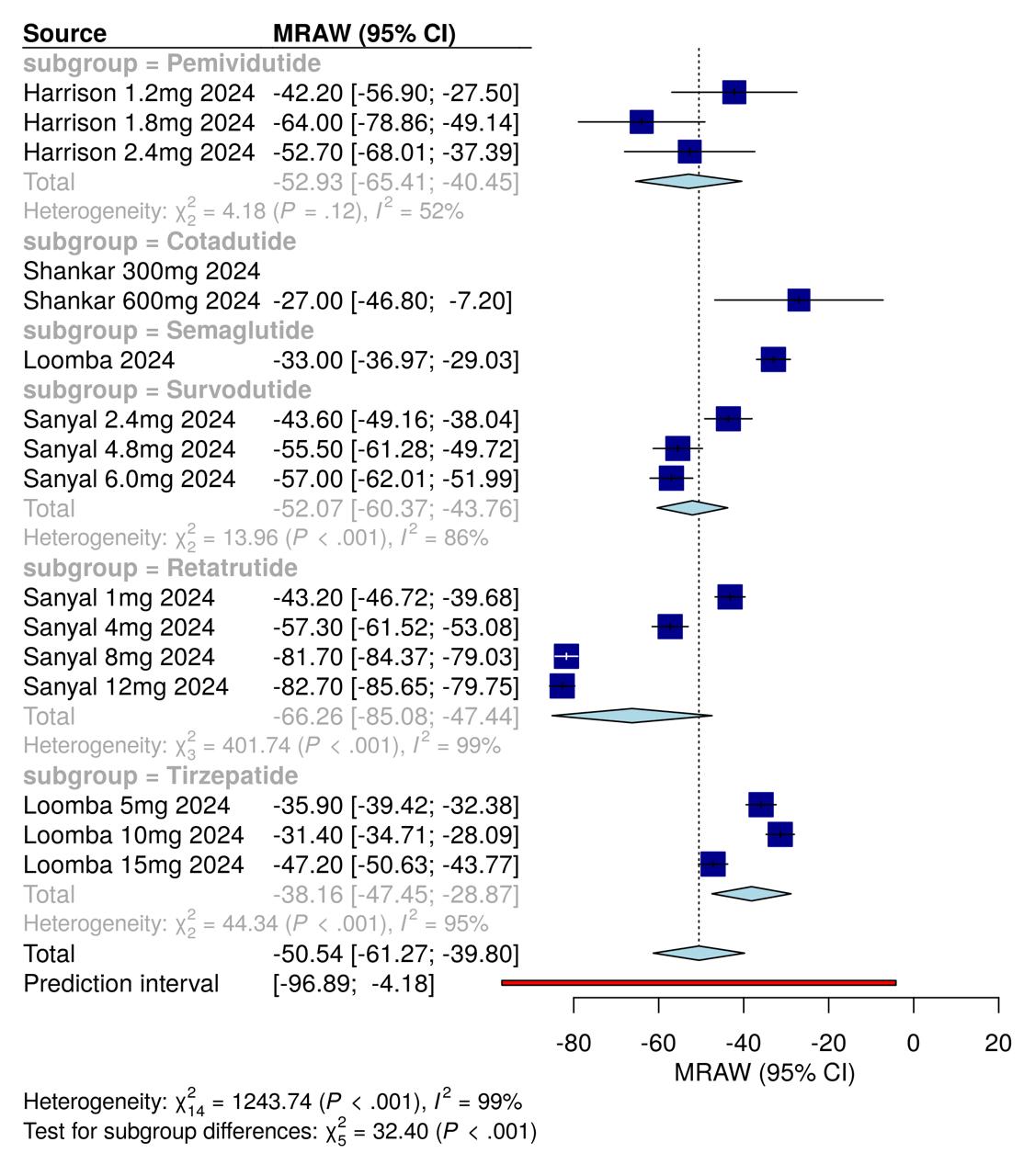Sunday Poster Session
Category: Liver
P1582 - Incretin-Based Therapies in MASH: A Meta-Analysis of Hepatic and Metabolic Outcomes
Sunday, October 26, 2025
3:30 PM - 7:00 PM PDT
Location: Exhibit Hall

Amanda Rigdon, MD
Lakeland Regional Health Medical Center
Lakeland, FL
Presenting Author(s)
Amanda Rigdon, MD1, Omar Zuhdi, MD1, Camila Vilicreses, DO2, Paola Campillo, MD1, Michael Sabina, DO3
1Lakeland Regional Health Medical Center, Lakeland, FL; 2Lakeland Regional, Lakeland, FL; 3Lakeland Regional, Lakeland Regional, FL
Introduction: Metabolic dysfunction-associated steatohepatitis (MASH), a progressive form of MASLD, is a leading cause of liver transplantation in the U.S., yet no FDA-approved pharmacologic treatments currently exist. Incretin-based therapies that target GLP-1 alone or in combination with GIP and/or glucagon receptors have emerged as promising agents for reducing hepatic fat and improving metabolic parameters. This meta-analysis evaluates the efficacy of GLP-1 monotherapy, dual, and triple incretin receptor agonists in MASH.
Methods: A systematic literature search of PubMed was conducted in accordance with PRISMA guidelines. Inclusion criteria were randomized controlled trials (RCTs) of ≥12 weeks duration that assessed quantitative liver fat reduction using MRI-PDFF, liver fat content (LFC), or hepatic fat fraction (HFF). Six RCTs met all criteria and were included. Outcomes assessed included liver fat reduction, ALT, AST, GGT, total cholesterol, LDL, and HDL. Risk of bias was evaluated using RoB 2.0, and meta-analysis was conducted using a random effects model.
Results: Incretin-based therapies significantly reduced liver fat in MASH patients. Triple agonist retatrutide achieved the greatest reduction (up to 83%), followed by dual GLP-1/glucagon agonists (pemvidutide: 64%, survodutide: 60%) and GLP-1/GIP agonist tirzepatide (47%). GLP-1 monotherapy (semaglutide) also reduced liver fat (39%) and improved liver enzymes. A dose-dependent relationship was evident. While most studies showed low-to-moderate risk of bias, heterogeneity was considerable (I² = 99%), reflecting variability in trial design and outcome assessment methods.
Discussion: This meta-analysis highlights the robust efficacy of incretin-based therapies in reducing liver fat among MASH patients. Multi-receptor agonists demonstrated superior outcomes compared to GLP-1 monotherapy, with glucagon receptor activation appearing pivotal in enhancing hepatic lipolysis. Although gastrointestinal side effects were common, therapies were generally well tolerated. Limitations include high study heterogeneity and variation in liver fat assessment techniques. Standardized endpoints and longer follow-up are needed to determine long-term clinical benefits. Incretin agonists, particularly dual and triple agents, represent promising therapeutic strategies in MASH management.

Figure: Figure 1: Primary Endpoint - Liver Fat Reduction

Figure: Table 1: Study Characteristics
Disclosures:
Amanda Rigdon indicated no relevant financial relationships.
Omar Zuhdi indicated no relevant financial relationships.
Camila Vilicreses indicated no relevant financial relationships.
Paola Campillo indicated no relevant financial relationships.
Michael Sabina indicated no relevant financial relationships.
Amanda Rigdon, MD1, Omar Zuhdi, MD1, Camila Vilicreses, DO2, Paola Campillo, MD1, Michael Sabina, DO3. P1582 - Incretin-Based Therapies in MASH: A Meta-Analysis of Hepatic and Metabolic Outcomes, ACG 2025 Annual Scientific Meeting Abstracts. Phoenix, AZ: American College of Gastroenterology.
1Lakeland Regional Health Medical Center, Lakeland, FL; 2Lakeland Regional, Lakeland, FL; 3Lakeland Regional, Lakeland Regional, FL
Introduction: Metabolic dysfunction-associated steatohepatitis (MASH), a progressive form of MASLD, is a leading cause of liver transplantation in the U.S., yet no FDA-approved pharmacologic treatments currently exist. Incretin-based therapies that target GLP-1 alone or in combination with GIP and/or glucagon receptors have emerged as promising agents for reducing hepatic fat and improving metabolic parameters. This meta-analysis evaluates the efficacy of GLP-1 monotherapy, dual, and triple incretin receptor agonists in MASH.
Methods: A systematic literature search of PubMed was conducted in accordance with PRISMA guidelines. Inclusion criteria were randomized controlled trials (RCTs) of ≥12 weeks duration that assessed quantitative liver fat reduction using MRI-PDFF, liver fat content (LFC), or hepatic fat fraction (HFF). Six RCTs met all criteria and were included. Outcomes assessed included liver fat reduction, ALT, AST, GGT, total cholesterol, LDL, and HDL. Risk of bias was evaluated using RoB 2.0, and meta-analysis was conducted using a random effects model.
Results: Incretin-based therapies significantly reduced liver fat in MASH patients. Triple agonist retatrutide achieved the greatest reduction (up to 83%), followed by dual GLP-1/glucagon agonists (pemvidutide: 64%, survodutide: 60%) and GLP-1/GIP agonist tirzepatide (47%). GLP-1 monotherapy (semaglutide) also reduced liver fat (39%) and improved liver enzymes. A dose-dependent relationship was evident. While most studies showed low-to-moderate risk of bias, heterogeneity was considerable (I² = 99%), reflecting variability in trial design and outcome assessment methods.
Discussion: This meta-analysis highlights the robust efficacy of incretin-based therapies in reducing liver fat among MASH patients. Multi-receptor agonists demonstrated superior outcomes compared to GLP-1 monotherapy, with glucagon receptor activation appearing pivotal in enhancing hepatic lipolysis. Although gastrointestinal side effects were common, therapies were generally well tolerated. Limitations include high study heterogeneity and variation in liver fat assessment techniques. Standardized endpoints and longer follow-up are needed to determine long-term clinical benefits. Incretin agonists, particularly dual and triple agents, represent promising therapeutic strategies in MASH management.

Figure: Figure 1: Primary Endpoint - Liver Fat Reduction

Figure: Table 1: Study Characteristics
Disclosures:
Amanda Rigdon indicated no relevant financial relationships.
Omar Zuhdi indicated no relevant financial relationships.
Camila Vilicreses indicated no relevant financial relationships.
Paola Campillo indicated no relevant financial relationships.
Michael Sabina indicated no relevant financial relationships.
Amanda Rigdon, MD1, Omar Zuhdi, MD1, Camila Vilicreses, DO2, Paola Campillo, MD1, Michael Sabina, DO3. P1582 - Incretin-Based Therapies in MASH: A Meta-Analysis of Hepatic and Metabolic Outcomes, ACG 2025 Annual Scientific Meeting Abstracts. Phoenix, AZ: American College of Gastroenterology.
